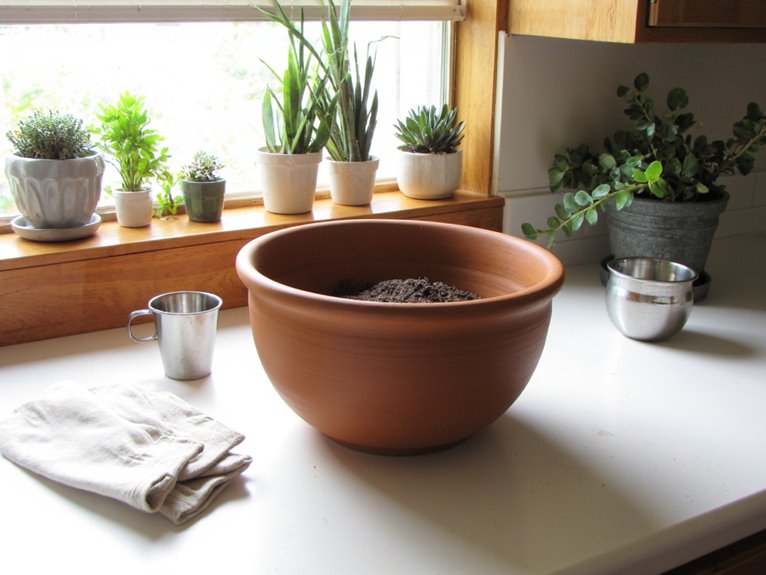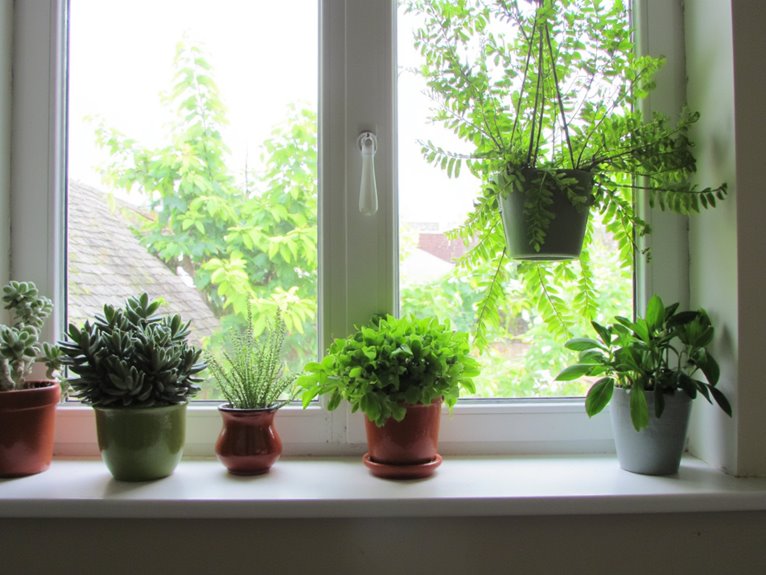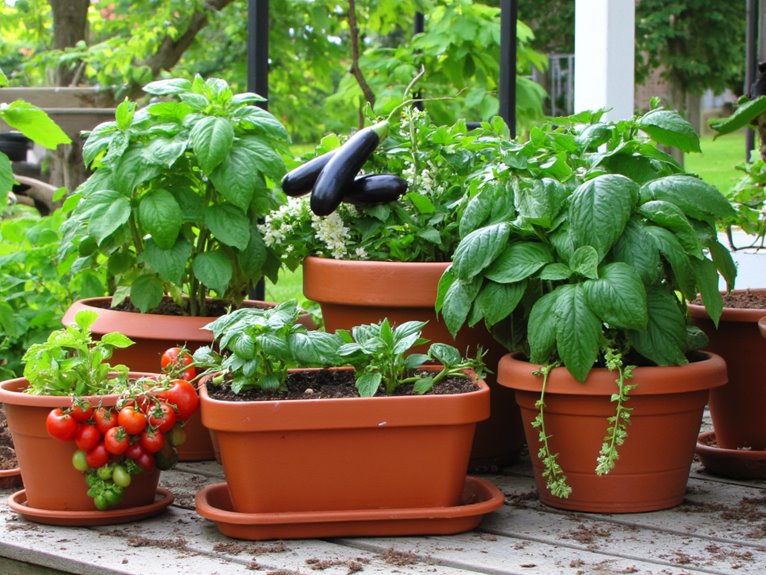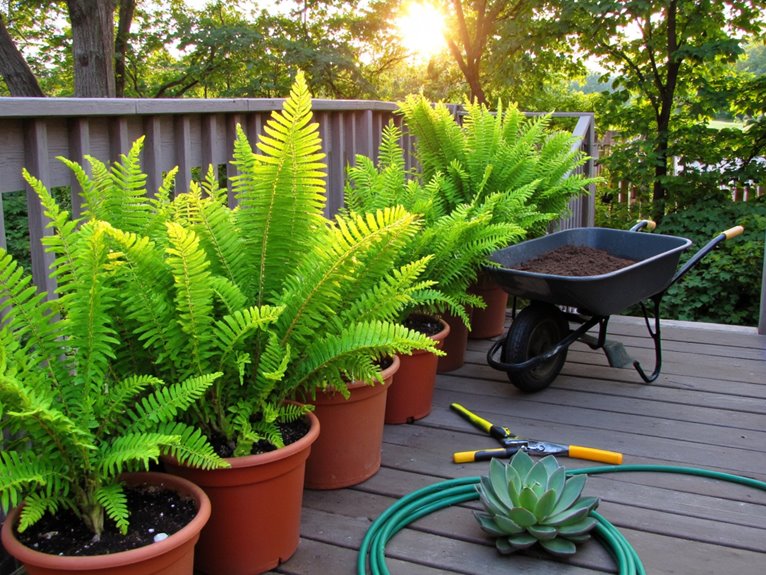DIY Garden Tool Alternatives: Household Items That Work
You can create practical garden tools from everyday items in your home. Cut plastic bottles for seed-starting domes or use them as mini-greenhouses with drainage holes. Old mailboxes make great storage solutions, while tulle cloth acts as a natural pest barrier. A kitchen spatula works as a hoe, and pruning shears can be replaced by scissors. These alternatives save money and reduce waste-perfect for any gardener looking to grow sustainably. Explore more creative solutions in our detailed guide.
Notable Insights
- Use plastic bottles cut into domes for seed starting with drainage holes and rubber band securing.
- Kitchen scissors and spatulas serve as lightweight pruning shears and hoes alternatives.
- Drape tulle cloth over plants to block pests naturally without chemical treatments.
- Repurpose pallets and mailboxes into raised beds or tool storage solutions.
- Coffee grounds, eggshells, and banana peels enrich soil fertility organically.
Transform Plastic Bottles Into Mini Greenhouses
When you’re ready to experiment with sustainable gardening, transforming plastic bottles into mini greenhouses offers a fun, low-cost way to grow plants while reducing waste. This simple project uses bottle planting techniques that create ideal conditions for seeds to sprout and thrive. By cutting bottles into two parts, you form a transparent dome perfect for protecting young plants.
To get started, remove labels, cut the neck off, and poke drainage holes in the bottom. Secure the top with a rubber band or plastic wrap to trap moisture-key for growth monitoring methods like checking soil dampness daily. Place seeds in the bottle-filled dirt and watch them germinate faster than usual.
These mini greenhouses also help shield plants from pests and harsh weather. As your garden grows, expand with more bottles or combine them into larger structures. With just a few household items, you’ve created an eco-friendly space that supports plant life at every stage. Position these bottle greenhouses in sunlit areas to maximize photosynthesis and plant growth.
Repurpose Old Mailboxes for Tool Storage
After exploring creative ways to repurpose everyday items for gardening, why not give an old mailbox a second life as your outdoor tool storage solution? These durable structures offer convenient Storage Solutions near garden beds, keeping tools within reach. Metal mailboxes provide Weather Protection against rain and moisture, extending tool lifespan.
| Tool Type | Fits? | Notes |
|---|---|---|
| Pruners | Yes | Store with batteries |
| Rakes | No | Need taller storage |
| Gloves | Yes | Keep dry and organized |
| Shovels | No | Consider vertical mounts |
Customize with paint or decor, making it both functional and stylish. This project supports sustainability by reusing existing materials.
Enhanced Content:
Consider adding a bracketed “Vertical Mount” option for longer tools like rakes and shovels, utilizing the mailbox’s exterior space creatively.
Create Natural Pest Barriers With Tulle Cloth
Although tulle is best known for its use in weddings, this fine mesh can become your garden’s gentle guardian against pests while still letting sunlight and rain nurture your plants. When properly secured, it blocks aphids, caterpillars, and beetles with its tiny holes, making it a great pest prevention method. However, tulle effectiveness testing shows it may restrict pollinators, so temporary removal is needed for flowering crops. Though less durable than garden mesh, its low cost and breathability make it ideal for short-term protection. Hang it on hoops or drape directly over plants, securing edges with weights or clips. For gardeners seeking chemical-free operation, tulle provides an eco-friendly alternative that poses no health risks to households with pets or children. Test this natural barrier on a small patch first to see how well it guards your specific garden pests.
Tulle as a Bird Deterrent Solution
Although less durable than garden mesh, its low cost and breathability make it ideal for short-term protection bird-friendly spacing.
Make Sustainable Bamboo Gardening Tools
Bamboo gardening tools offer a lightweight yet durable alternative to plastic and metal, making them perfect for hands-on garden work. Their design durability comes from bamboo’s natural strength, allowing tools like forks and trowels to last years with proper care. By choosing bamboo, you reduce your carbon footprint substantially, as it absorbs more CO2 than most forests during growth.
You can craft simple yet effective gardening essentials using this sustainable material-think lightweight pruners or ergonomic scoops. Pair these with natural adhesives and avoid synthetic coatings to maintain biodegradability. Store tools dry to prevent warping, ensuring they serve you season after season while supporting eco-friendly practices in your garden. When creating specialized tools for tropical plants, consider that bamboo scoops work excellently for applying granular fertilizers around delicate root systems without causing damage.
Use Clothespins as Plant Support Systems
Let’s shift our focus from bamboo tools to another everyday item that can work wonders in the garden-clothespins! These versatile clips offer a simple solution for supporting climbing plants, marking seedlings, or even holding up trellises.
| Feature | Traditional Wood | Thermoplastic Rubber |
|---|---|---|
| Durability | Moderate | High |
| Stem Damage Risk | Higher | Lower |
| Weather Resistance | Limited | UV-stabilized options |
How do different materials like wood versus thermoplastic rubber affect plant stem health? Wood’s rough texture risks abrasion, while soft rubber provides gentle support. What are the historical evolution and cultural variations in using clothespins for plant support? From ancient China to Victorian gardens, these humble clips have adapted across cultures while serving similar purposes.
Convert Kitchen Containers Into Seed Starters
While traditional seed trays often come at a cost, kitchen containers offer a budget-friendly alternative that turns everyday items into perfect plant starters. Container selection methods vary-yogurt cups need drainage holes, while clear plastic takeout boxes create greenhouse effects. Sterilization techniques for pots include washing thoroughly and using food-safe plastics. Egg cartons and paper rolls are biodegradable options to minimize transplant shock. By repurposing what’s already on hand, you’ll save money and reduce waste-perfect for any gardener looking to grow without breaking the bank or the environment. When seedlings are ready for transplanting, ensure your containers are 1-2 inches larger than the current root ball size for healthy continued growth.
DIY Garden Sprayers From Household Bottles
Rather than purchasing costly sprayers, you can convert common plastic bottles into efficient gardening tools that make watering plants effortless. PET soda bottles offer sturdy containers for DIY sprayers, while mineral water caps provide simple-piercing nozzles. Customize spray patterns by drilling multiple holes in the cap for precise misting needs. Attach weighted tubing to guarantee steady flow from any angle, addressing Material Durability Concerns through careful construction. These homemade solutions save waste and money while delivering professional-level hydration control for your garden.
Craft Composting Aids From Everyday Items
Did you know your kitchen scraps could become garden gold? Transform banana peels, coffee grounds, and eggshells into natural fertilizer mixes that enrich soil with nutrients like potassium and calcium. Pair these green materials with paper bags, cardboard tubes, or shredded newspaper for balanced compost heaps. Build sturdy household compost bins from pallets or crates to contain your waste while deterring pests. Chop woody prunings and mix in straw for aeration. Let these everyday items decompose into dark, crumbly soil perfect for containers or gardens. Start small-your kitchen becomes a resource hub for sustainable growing!
Frequently Asked Questions
How Do I Clean Old Mailboxes for Tool Storage?
Clean old mailboxes for tool storage by mixing soap and water, scraping off old paint, and drying thoroughly. Use vinegar or alcohol-based sprays for Creative mailbox cleaning techniques. Seal gaps with tulle for Effective pest prevention.
Can Tulle Cloth Completely Prevent Pests From Plants?
No, tulle can’t completely prevent pests from plants. While it offers good Tulle effectiveness as a physical barrier, its small holes and fragility mean some insects might still get through, especially over time or in harsh weather. Combine it with other pest prevention methods for best results.
Are There Alternative Materials to Bamboo for Tools?
Yes, there are alternatives to bamboo for tools – plastic, metal, wood, and wicker. Metal’s durable but heavy, while plastic offers lightweight flexibility. Reclaimed wood and woven wicker provide sustainable options too.
How Do I Attach Clothespins to Support Heavy Vines?
How do I attach clothespins to support heavy vines? Fasten them securely to a strong wire or pole, spacing clips evenly. Use sturdy wooden ones and avoid plastic. Place pressure gently to not damage stems. Check often and add more clips if needed for extra weight.
What’s the Best Way to Sterilize Containers for Seeds?
The best way to sterilize containers for seeds is using 3% hydrogen peroxide or diluted bleach. Boiling times can also kill pathogens, as can UV light methods if you have a lamp. Just make sure to rinse well and let them air dry before planting.
On a final note
With these creative alternatives, you can transform everyday items into essential gardening tools and solutions. Whether you’re building a greenhouse from plastic bottles or using clothespins for plant support, the possibilities are endless. Embrace this opportunity to engage with nature in a sustainable way-your garden will thank you. Happy planting!






